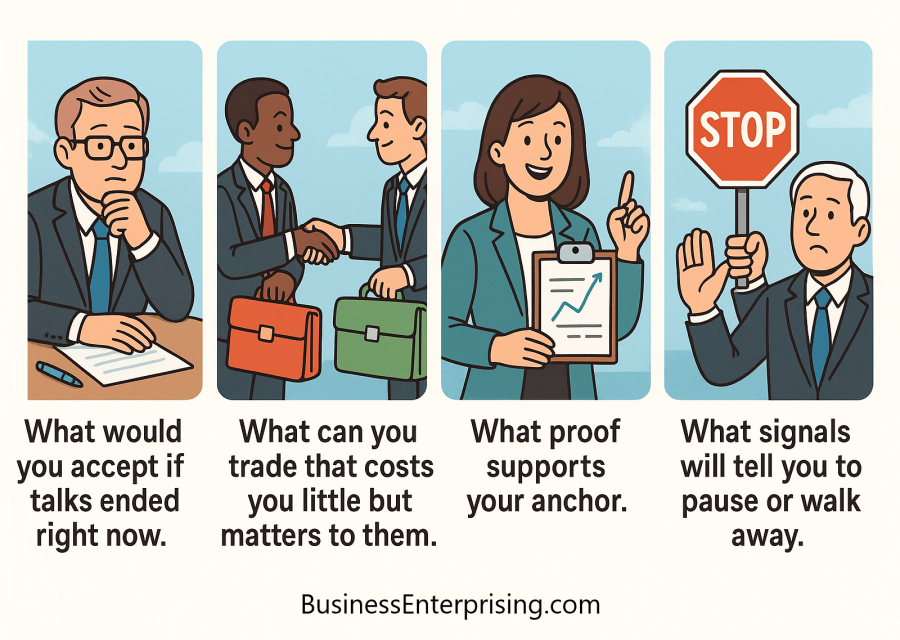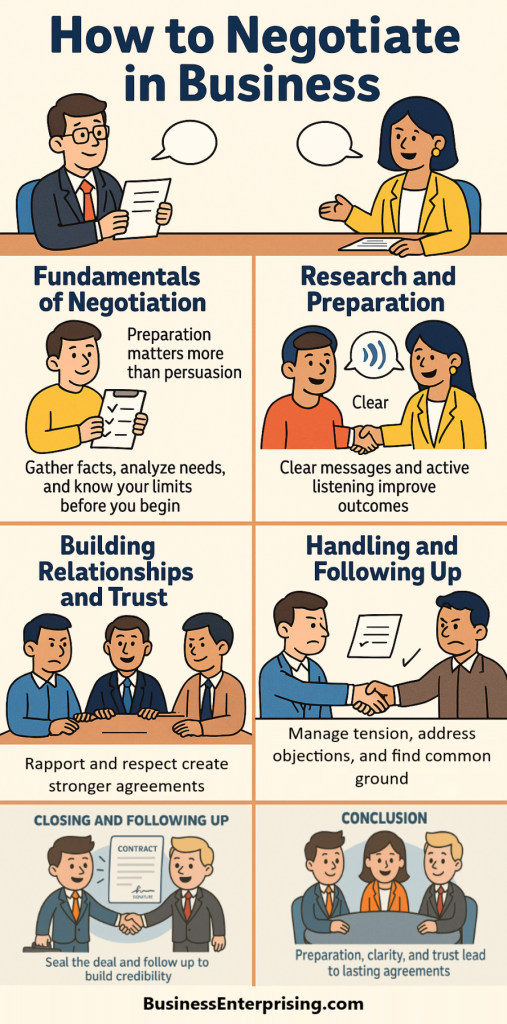
However, many people think negotiation is about winning or dominating the other side. In reality, the most effective negotiations balance interests. You should focus on finding solutions that benefit both parties. Therefore, you create agreements that last and relationships that grow over time. Additionally, this approach strengthens your credibility and keeps future opportunities open.
Preparation is another key to success. You need to understand your own goals and anticipate the priorities of the other side. Therefore, research and planning give you the tools to adapt in real time. Moreover, entering a discussion prepared allows you to remain calm and confident under pressure. With clear objectives, you avoid mistakes that weaken your position.
Additionally, communication and listening shape how negotiations unfold. When you express yourself clearly and listen with intent, you reduce misunderstandings. Therefore, you create a constructive environment where both sides feel respected. Moreover, strong communication helps resolve conflicts more quickly and keeps the focus on solutions.
Negotiation is more than a single interaction. It is a process of preparation, discussion, and follow-up. Therefore, your success depends on how well you combine these elements. Additionally, with practice and strategy, you can strengthen your ability to reach fair, productive, and lasting agreements.
Understanding the Fundamentals of Negotiation.
Negotiation in business is more than a contest of words. It is the process of reaching agreements that benefit both parties. When you think about how to negotiate in business, preparation matters more than persuasion. You succeed when you understand what you need and what the other side values.
Additionally, preparation provides you with confidence. You enter discussions knowing your priorities, limits, and possible outcomes. Therefore, you spend less time improvising and more time focusing on solutions. Moreover, this preparation allows you to ask meaningful questions and recognize opportunities that align with your goals.
Persuasion may feel powerful, but it is not a substitute for planning. You can speak well and still lose leverage. However, careful research ensures your words carry weight backed by knowledge. Therefore, your proposals sound reasonable and supported by facts. Additionally, preparation makes you adaptable when discussions shift unexpectedly.
Another key element is clarity. You must know what you want before you start talking. Therefore, outline your objectives and recognize where you can compromise. Additionally, anticipate objections so you have calm, structured responses ready. With this approach, you stay focused without being reactive.
Negotiation is also about building trust. You show professionalism when you are well prepared. Therefore, the other party views you as serious and reliable. Additionally, this respect increases the likelihood of finding common ground. Preparation positions you as someone who values long-term relationships, not short-term wins.
When you prioritize preparation over persuasion, you create stronger agreements. Therefore, you improve your results while maintaining respect and credibility in every business negotiation.
Research and Preparation Before Negotiations
Preparation is the foundation of every successful negotiation. When you study how to negotiate in business, you realize that research shapes outcomes. Entering a discussion without preparation leaves you vulnerable and reactive. However, when you gather facts and insights, you gain the confidence to guide the conversation effectively.
Additionally, research allows you to understand the other party’s needs. You identify what matters most to them and where flexibility may exist. Therefore, you can position your offers in ways that appeal directly to their priorities. Moreover, this understanding builds trust, as the other side feels heard and respected during the process.
Knowing your own limits is equally important. You should set clear boundaries about what you can accept and where you must decline. Therefore, you protect your interests without creating unnecessary conflict. Additionally, limits prevent you from making commitments that hurt your business later. With defined boundaries, you can negotiate with clarity and strength.
However, preparation is not only about your position. It also involves anticipating potential objections. Therefore, you create responses in advance that address concerns calmly and constructively. Additionally, this preparation prevents you from being caught off guard. The more scenarios you consider, the more adaptable you become in the discussion.
Thorough research also strengthens your credibility. When you present accurate data and realistic expectations, others view you as professional and reliable. Therefore, you increase the likelihood of reaching agreements that work for both sides. Additionally, preparation makes you efficient, saving time and reducing misunderstandings. When you combine research, analysis, and clear limits, you improve every negotiation. Therefore, preparation remains your most powerful tool for building fair and lasting agreements.
Effective Communication and Listening Skills
Communication is one of the most important skills you can develop when learning how to negotiate in business. Success depends on more than presenting your position. It also requires listening carefully, speaking clearly, and asking thoughtful questions. These skills create understanding and reduce the risk of miscommunication during discussions.
Additionally, active listening shows respect and builds trust. When you focus on what the other party says, you gather insights that guide your responses. Therefore, you avoid assumptions and can address concerns directly. Moreover, people are more open to compromise when they feel their perspective has been acknowledged. Listening strengthens your ability to respond with relevance and clarity.
Clear messaging is equally important. You should explain your points in simple, direct terms. Therefore, you reduce confusion and create alignment. Additionally, clear communication helps you control the tone of the negotiation. When you express yourself with precision, your counterpart has fewer opportunities to misinterpret your meaning.
However, communication is not only about speaking. Asking the right questions allows you to uncover needs and identify areas for agreement. Therefore, thoughtful questions demonstrate preparation and signal that you value the other person’s input. Additionally, well-placed questions guide the discussion toward solutions rather than conflict. This approach strengthens your influence without creating pressure.
Effective communication blends clarity, listening, and inquiry into one strategy. Therefore, you establish a balanced conversation that fosters cooperation. Additionally, these skills make you adaptable, allowing you to manage unexpected turns in the discussion. Strong communication ensures negotiations end with agreements that feel fair to everyone involved.
Building Relationships and Trust
When you think about how to negotiate in business, relationships and trust are as important as numbers or terms. Agreements built on respect last longer and create more value for everyone. Additionally, trust turns one-time deals into ongoing opportunities that benefit both sides.
Rapport lays the foundation for productive discussions. You build rapport by showing genuine interest, listening carefully, and treating the other party with respect. Therefore, conversations feel less like a competition and more like collaboration. Moreover, when people feel understood, they are more willing to compromise and explore creative solutions.
Additionally, long-term thinking strengthens negotiations. You should approach each agreement with the future in mind, not only the immediate results. Therefore, you set the stage for stronger partnerships that grow over time. Respecting long-term interests creates stability, and businesses appreciate relationships that extend beyond a single transaction.
However, building trust requires consistency. You must keep your commitments and follow through on what you promise. Therefore, your counterpart views you as reliable and dependable. Additionally, trust increases your influence in future discussions because the other party values your credibility.
Strong relationships reduce conflict and simplify negotiations. When trust exists, disagreements become easier to resolve because both sides know the intent is fair. Therefore, you spend less time defending positions and more time finding solutions. Additionally, this approach creates goodwill that can extend into future opportunities. When you focus on rapport, respect, and long-term goals, your negotiations become more productive. Therefore, you achieve stronger agreements and open doors for continued success.
Handling Conflict and Finding Common Ground
Conflict is a natural part of negotiation, and knowing how to address it makes discussions more productive. When you study how to negotiate in business, you learn that tension can be managed without damaging relationships. Disagreements often reveal the real issues that need solutions.
Additionally, staying calm during conflict keeps the conversation constructive. You should listen carefully to objections and acknowledge them without becoming defensive. Therefore, the other party feels respected and understood. Moreover, this approach lowers resistance and opens the door for compromise. By showing patience, you reduce tension and move toward solutions.
However, overcoming objections requires preparation. You need clear responses that address concerns directly and logically. Therefore, you should back your points with facts and realistic examples. Additionally, ask questions to clarify what the other side truly needs. This helps you separate genuine barriers from simple misunderstandings. With clarity, you can find options that meet both interests.
Finding common ground is often the best path forward. You may not agree on everything, but shared goals usually exist. Therefore, focus on areas where both sides benefit. Additionally, highlight mutual interests to shift the discussion from conflict to collaboration. When you frame issues as joint challenges, solutions feel more achievable.
Turning disagreements into workable agreements builds credibility and strengthens trust. Therefore, you leave the negotiation with progress instead of frustration. Additionally, managing conflict effectively shows professionalism that carries into future opportunities. When you resolve disputes thoughtfully, you create agreements that support long-term business relationships.
Closing Deals and Following Up
Closing a deal is the point where preparation and discussion turn into agreement. When you study how to negotiate in business, you realize closing is more than getting a signature. It is about confirming clarity, setting expectations, and building confidence in the agreement. Therefore, you must approach this stage with focus and precision.
Additionally, clear communication is critical when finalizing terms. You should restate key points and confirm mutual understanding before moving forward. Therefore, both parties leave with aligned expectations. Moreover, addressing any last questions demonstrates professionalism and reduces the risk of future disputes. By making sure everything is understood, you set the stage for smoother execution.
However, closing a deal does not end your responsibility. Following up is essential to maintaining credibility and strengthening relationships. Therefore, you should reach out after agreements to confirm progress and address concerns. Additionally, follow-up signals that you value the relationship beyond the transaction. Consistent communication builds trust and shows reliability over time.
Following up also creates opportunities for future growth. You may identify ways to support the other party further or explore new agreements. Therefore, your attention strengthens ties and keeps your business top of mind. Additionally, strong follow-up demonstrates your commitment to long-term success, not only immediate results.
Closing with care and following up with consistency set you apart. Therefore, you protect your credibility while opening doors for future opportunities. Additionally, these practices build relationships that last, making each negotiation a step toward stronger business ties.
Conclusion
Learning how to negotiate in business is about more than securing agreements. It is about building lasting relationships that create value over time. Every discussion provides an opportunity to show respect, strengthen credibility, and set the stage for future opportunities. Therefore, approaching negotiations with preparation, patience, and professionalism benefits you long after the deal is signed.
Additionally, your ability to listen and communicate clearly shapes outcomes. When you ask thoughtful questions and respond with clarity, you reduce conflict and build understanding. Therefore, you establish trust that extends beyond a single agreement. Moreover, consistent communication helps you handle challenges without damaging the relationship. These skills make negotiations more productive and outcomes more balanced.
However, trust and follow-up remain essential after agreements are reached. You show reliability when you honor commitments and maintain contact. Therefore, others view you as a dependable partner who values long-term collaboration. Additionally, consistent follow-up creates opportunities to revisit agreements, improve relationships, and uncover new business. By nurturing connections, you transform negotiations into ongoing partnerships.
Successful negotiation also relies on adaptability. Conditions change, and each discussion requires flexibility in your approach. Therefore, you must balance firmness with cooperation to find solutions that satisfy both sides. Additionally, adaptability shows confidence and resilience, two traits respected in every business setting.
Your success in negotiation reflects your preparation, communication, and relationship-building. Therefore, when you focus on these elements, you improve outcomes while preserving respect and opportunity. Additionally, every negotiation becomes a step toward stronger credibility and lasting success.



